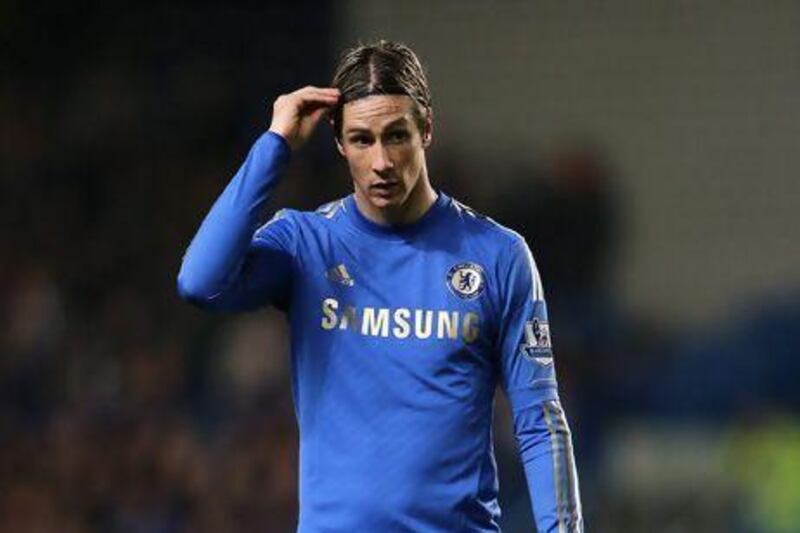January 31, 2011 is the day that football's transfer market, some would say football itself, jumped the shark.
Chelsea paid a British transfer record of £50 million (Dh297.5m) for Liverpool's Fernando Torres. Liverpool, in turn chucked £35m of that at Newcastle United for the services of Andy Carroll.
Both have since lived to regret such extravagance, in the process providing cautionary tales for other clubs, not to mention a gold mine of jokes for rival supporters.
Torres scored just one goal in his first 18 games for Chelsea, and 12 in his first 67 matches, though he was part of a squad that won the FA Cup and Champions League last season.
Likewise, Carroll went from a player who couldn't stop scoring at Newcastle to one with just 11 goals in 58 games for his new club, hardly justifying the price tag. He has already been shipped off on loan to West Ham United.
Blame it on the winter transfer window. It is the month when the football world, not the most rational of places at the best of times, completely takes leave of its senses.
Logic? Financial prudence? Long-term planning? Not when your supporters have been baying for (new) blood ever since that first defeat of the season.
Since its introduction in 2003, the January window has taken on a cultural significance all of its own. It may last 30 days, but in recent years it might as well have been just one-deadline day.
And one league stands alone as a monument to its sheer excess: the English Premier League.
The media, led by the Big Brother of English football, Sky Sports, have helped create this monster. But it is the clubs that keep it alive, to their own obvious detriment.
It is football's equivalent of last-minute Christmas shopping; paying overinflated prices for the latest must-have toy or gadget.
It is all there: the manufactured drama, the painful lack of self-awareness, the misplaced sense of self-importance. Naturally, it is one of the football calendar's most defining days. Player sightings take on mythical proportions, as if they were Elvis or Big Foot. Outside football grounds, every taxi, every opened door is breaking news.
Online websites run blow-by-blow blogs. Above all, managers behave with the calmness of a school kid who has left all his studying to the night before an exam.
It is a big day for the country's modes of transport too.
Here is Ryan Babel on a helicopter. Was that Edin Dzeko seen hopping on a Manchester-bound plane in Germany?
And of course no deadline day is complete without Michael Owen, a player seemingly in a constant state of availability, being limousine-chauffeured to the latest club willing to offer him a place on their substitute's bench.
For pure hysteria however, there is one place to be: Twitter.
This is where failing to sign a highly rated 19-year-old Belgian striker who no one has actually seen play, or a Clint Dempsey, is treated with apocalyptic indignation by foaming-at-the-keyboard fans.
But this year, it seems that something has changed.
And it is no surprise that the two clubs most burnt in the past have made the first significant moves of the current window; Liverpool signing Daniel Sturridge from Chelsea for £12m, the London club in turn grabbing Demba Ba from Newcastle for £7m. A far cry from the hubris of the Torres and Carroll deals.
Perhaps clubs are finally learning the blindingly obvious.
West Ham United have already concluded the signings of the underachieving Marouane Chamakh and Joe Cole, two players that in recent years would have been nailed-on deadline day targets.
Meanwhile, those transfer window hypnotists at Newcastle have, in addition to selling Ba, completed the understated signing of Mathieu Debuchy from Lille for £6m.
Arsenal, Manchester United and Manchester City, on the other hand, have made it clear they will only sign if absolutely necessary.
The surprise is that this outbreak of common sense has taken so long. By doing early business, not only do buying clubs avoid being held to ransom by the selling ones, they also benefit from the services of their new signings for an extra month.
Arsenal coach Arsene Wenger could well be right. Maybe financial realities have finally caught up with football clubs.
Or perhaps, as Sir Alex Ferguson consistently claims, there is just "no value" in January sales. For all but the most desperate of clubs, it makes far more sense to wait for the summer window (which has its very own manic deadline day, of course).
But do not bank on it.
Sure, like the parent who has missed out on that toy for their kid last Christmas, football managers will no doubt be promising themselves that they will not make the same mistakes again.
But toy shops are never empty on December 24, and it is unlikely January 31 will be a quiet deadline day either.
Football clubs are just not that sensible. Besides, Sky Sports, and Twitter, will simply not allow it.
Follow us
[ @SprtNationalUAE ]





